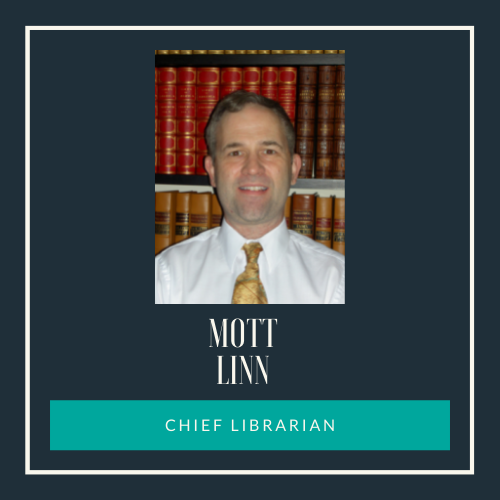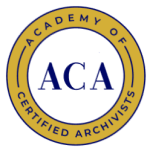Mott Linn, Candidate for Regent for Examination Development

PROFESSIONAL EXPERIENCE:
Chief Librarian Los Alamos National Laboratory, 2019-2021
Head of Collections Management Clark University, 2008-2019
Coordinator of Archives and Special Collections Clark University, 1998-2008
Manager of Video Archives National Hockey League, 1993-1997
Archivist Philadelphia Flyers, 1986-1993
EDUCATION:
- Doctor of Arts in Library Leadership, Simmons College: 2008
- Master of Public Administration, Clark University: 2003
- Master of Science in Library and Information Science, Drexel University: 1992
- Master of Arts in History, University of Wisconsin, Madison: 1985
- Bachelor of Arts in History, University of Delaware: 1983
PROFESSIONAL ACTIVITIES:
- Academy of Certified Archivists: Member, 1991-Present; Distinguished Service Award, 2018; President, 2014-2017; Treasurer, 2008-2012; Exam Development Committee, 2014-2015; Item Writing Workshop, 2017 and 2019; Finance Committee member, 2012-2016 and 2021-Present.
- Society of American Archivists: Member, 1986-Present; Chair of the Archives Management Section, 2021-Present; Chair of Archives Management Roundtable, 2011-2014; College and University Section Steering Committee: 2002-2005.
- Association of Moving Image Archivists, Member, 1991-Present.
“What is the role of archival certification in the modern work environment?"
Just as being Board Certified is imperative for doctors and having passed the bar exam is crucial to be a lawyer, being a Certified Archivist should be just as important for archivists. Certification or licensure is needed for many professions and should also be expected for archivists. Although today nobody would want to hire a doctor who is not Board Certified, Board Certification did not exist 150 years ago; hopefully, in the near future, nobody will want to hire an archivist who is not certified.
Certification allows everybody involved to have peace of mind that the archivist knows what they are doing; this includes the employers, the researchers, and the archivists themselves.
As an example, when I took charge of the archives at the Los Alamos National Laboratory, I was their first Certified Archivist. Because I know the value of having archivists who have proven their competence, in less than three years we had grown to having ten CAs. As the supervisor, this allowed me to have confidence in their abilities. This is why I always want to hire CAs and encouraged my other archivists to become certified.
Certification is important not only because it proves via the exam that the CAs have the knowledge to be an archivist, but they have to keep up with the changes in the profession because they have to recertify. Just as the recertification of doctors is critical to ensure that they keep up with changes in the medical field, recertification is imperative for archivists so that their work remains up-to-date.
Because of the critical role that the exam plays in determining who has and who does not have the competence to be an archivist, I pledge that I will do everything that I can to make the exam as good as possible.
